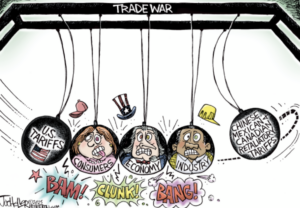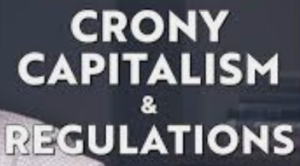The Editorial Board of the Wall Street Journal rightly criticizes “the Trump tariff roller coaster.” Three slices:
President Trump gave a one-month tariff reprieve to auto makers on Wednesday, a day after his 25% tax on imports from Mexico and Canada took effect. Everyone else will still pay. Welcome to the Trump tariff thrill ride, where you never know what’s going to happen next.
…..
The exemption may also be less than meets the eye. According to the White House statement, the exemption will apply to cars imported from Mexico and Canada. That means manufacturers could still get whacked with tariffs on parts and materials that cross the border, which could add thousands of dollars to the cost of each vehicle.
Manufacturers that assemble cars in North America would still be at a competitive disadvantage. Mr. Trump said in his speech to Congress Tuesday that his policies would allow “our auto industry to absolutely boom.” Executives, investors and dealers beg to differ. General Motors stock is down 11.9% since Mr. Trump’s election while Ford Motor’s is 13.5% lower.
…..
Mr. Trump originally justified the tariffs under an emergency law to combat the alleged threat of fentanyl. But he claimed Tuesday the tariffs are needed because “we pay subsidies to Canada and to Mexico of hundreds of billions of dollars” and have “very large deficits with both of them.”
That sounds like White House protectionist in chief Peter Navarro. He and his boss love tariffs for their own sake. Meanwhile, the tariff barrage is causing economic uncertainty and slowing investment—a real thrill a minute.
My GMU Econ colleague Vincent Geloso makes the case for a policy of unilateral free trade. A slice:
The first, and most famous, episode of unilateral liberalization was the abolishing of the tariffs (known as the Corn Laws) on all grain imported into Britain. The Corn Laws had the effect of keeping food prices in the UK 9% higher relative to world markets. Since food items were a major component of the budgets of the poor, the repeal of the tariffs was largely a “pro-poor” policy.
The repeal is such a momentous event in British history that some historians argue it “fixed in the minds of the British working class in particular, right up to the present day, the profound belief that free trade is good for the poor and the working man and woman” and that this is why “the lower middle class and the working class in Britain is and always has been solidly in favor of free trade.”
But Britain is far from the only case. Most of the trade liberalization of the 19th century was done unilaterally. Historically, there are multiple Canadian episodes of unilateral liberalization. More recent examples include Australia’s massive reduction of manufacturing tariffs starting in the 1980s and Switzerland’s 2024 abolition of all import taxes on industrial products regardless of origin.
GMU Econ alum Dominic Pino understandably calls Trump’s statements about agricultural trade and tariffs “bizarre.” Two slices:
The agricultural trade balance used to be a consistent surplus in the supposedly awful times when NAFTA was in effect and China was buying larger amounts of U.S. agricultural exports. In 2019, the year after Trump’s China tariffs took effect, the U.S. ran its first agricultural trade deficit since at least 2001.
The administration knew that the decline in exports that year was because of retaliatory tariffs, so it spent billions of taxpayer dollars bailing out farmers to make up for it.
…..
This is what “decoupling” from China looks like in practice in the agricultural sector. It means farmers get hammered. It means that the trading relationships built up in many cases by Republican governors of agricultural states get destroyed.
Maybe Trump thinks that’s for the greater good. There’s a case to be made that the agriculture sector, which is relatively small, is worth sacrificing for some geopolitical goal. Even in Iowa, a heavily agricultural state, farming accounts for 5.9 percent of GDP. That’s about the same proportion as retail trade. Manufacturing accounts for almost three times as much. Finance, insurance, and real estate account for almost four times as much.
For the country as a whole, farms accounted for less than 1 percent of GDP in 2023. If Trump wants to throw them under the bus for the sake of his trade war, maybe you could say that’s pro-American. But you can’t say it’s pro-farmer.
Trump is taking farmers for granted, saying he loves them while pursuing policies he knows will harm them. He probably thinks they mostly live in states Republicans win in elections anyway, and he’ll be happy to bail them out with your money for their loyalty.
Scott Lincicome explains that new Trump trade actions against lumber imports will raise prices for homebuilders (and, hence, for home buyers). A slice:
On March 1, President Trump instructed the Secretary of Commerce to initiate an investigation under Section 232 of the Trade Expansion Act of 1962 on the effects of imported timber, lumber, and their derivative products on US national security. This case follows an amended Section 232 action on steel and aluminum from early February and a new investigation of copper imports launched this week.
President Trump’s affinity for the law is nothing new. As Inu Manak and I documented in a 2021 Cato paper, Trump repeatedly invoked—and abused—Section 232 during his first term to initiate several investigations and to impose the aforementioned steel and aluminum tariffs on dubious grounds, raising a host of legal, economic, and procedural concerns along the way.
Trump’s new Section 232 action on wood products, however, ratchets up those concerns to a whole new level, in the process revealing many of the fundamental problems with the law that we first highlighted four years ago.
Most obviously, new tariffs or other import restrictions on lumber and other wood products would mean higher prices for those things in the US market—a particularly heavy burden for already-struggling American homebuilders and homebuyers.
Contrary to President Trump’s frequent assertions, Americans paid the tariffs he imposed in his first term, and research we commissioned in 2022 found that US “trade remedy” tariffs (i.e., anti-dumping and countervailing duties) on lumber and other construction materials lead to a persistent increase in their domestic prices—costs builders often passed on to homebuyers.
George Will highlights the unseriousness of MAGA. A slice:
Protectionism is another manifestation of Trump’s courage. He has plucked from the air a number — 25 percent seems to entrance him — as a properly muscular way to (in Rubioese) “stand up for” America with tariffs against two of its economic tormentors. MAGA means protecting America (2024 GDP: $29.16 trillion) from Canada ($2.21 trillion) and Mexico ($1.84 trillion).
My intrepid Mercatus Center colleague, Veronique de Rugy, writes wisely about DOGE and its critics. Here’s her conclusion:
Where does that leave us? With the same old truth that we must soon reform entitlement spending to make Medicare, Medicaid and Social Security sustainable. But we must also cut as much as possible of the absurd waste that infects the budget. Rather than endorsing a false choice, we, the people, should simply demand that Congress be the good steward of our tax dollars it was intended to be. Regardless of what DOGE does.
Chris Freiman makes the case against capping interest rates on credit cards.
John Stossel compares America’s economy to that of Europe.
Understandable and commendable as it may be to be concerned about the fate of fellow human beings, that is very different from being obsessed with the fate of numbers in an abstract category. To say, as Professor Thomas Piketty does in his much acclaimed book, Capital in the Twenty-First Century, that “the upper decile is truly a world unto itself” is to fly in the face of the fact that most American households – 53 percent – are in the top decile at some point in their lives, usually in their older years. For most Americans to envy or resent the top ten percent would be to envy or resent themselves. This is not even “class warfare,” but confusion between social classes and age cohorts.



 What’s wrong with protectionism? In a word, everything.
What’s wrong with protectionism? In a word, everything. Complicated regulations create a fixed cost for established companies that they handle with divisions of specialists. But for startups with few employees and little capital, these regulations act as direct barriers to entry.
Complicated regulations create a fixed cost for established companies that they handle with divisions of specialists. But for startups with few employees and little capital, these regulations act as direct barriers to entry.  Most mercantilist measures involved a burden on some occupational or regional sectors of the population. Such sectors, without challenging the general objectives of mercantilism, would commonly resort to all the forms of pressure and persuasion available to them to obtain relaxation of the measures or a revision of them which would shift the burdens elsewhere. Thus, in England the graziers would press for a relaxation on the export of raw wool, and the independent merchants would protest vigorously against the special privileges granted to the trading companies. Even where absolute monarchy prevailed, governments found it necessary to make concessions to dissenting groups.
Most mercantilist measures involved a burden on some occupational or regional sectors of the population. Such sectors, without challenging the general objectives of mercantilism, would commonly resort to all the forms of pressure and persuasion available to them to obtain relaxation of the measures or a revision of them which would shift the burdens elsewhere. Thus, in England the graziers would press for a relaxation on the export of raw wool, and the independent merchants would protest vigorously against the special privileges granted to the trading companies. Even where absolute monarchy prevailed, governments found it necessary to make concessions to dissenting groups.
